In this Meeting Note Aswathy Chandrakumar, Misha Madhavan M, Sulaja O.R and Hema M share their feedback after participating in the Winter School conducted by ICAR-CMFRI from 11 to 31 January 2023.
CONTEXT
There are plenty of multivariate statistical methods available for Social Science research. The use of appropriate statistics helps in quantifying the relationship in a social phenomenon and deriving appropriate interpretations from the raw data. The choice of appropriate statistical tools enhances the quality of research, and also provides several leads for further research. The discipline of statistics has witnessed a sea change, however, use of outdated analytical methods or inappropriate tools for data analysis has led to poor quality of research outputs. Often researchers lack adequate knowledge on the assumptions behind the statistical method used, the type of data required for using a particular statistical tool, and lack the necessary expertise in handling statistical software. Offline training programmes on advanced analytical tools assume greater significance, despite the availability of both online and offline resources.
PRELUDE TO THE TRAINING PROGRAMME
The 21-day ICAR-sponsored Winter School was organized by the ICAR-Central Marine Fisheries Research Institute, Kochi from 11-31 January 2023. The training was meticulously planned under the able guidance of course director Dr Eldho Varghese, Senior Scientist, Fisheries Resource Assessment and Economics Division, ICAR-CMFRI. Along with him, Dr Reshma Gills, Scientist (Agril. Extension) and Dr Anuja AR, Scientist (Agril. Economics), Fisheries Resource Assessment and Economics Division, served as course co-directors. The training was structured so as to cover basic concepts all the way to advanced analytical tools, and consisted of both offline and online sessions. The sessions were formulated with the specific objectives of acquainting the participants with advanced analytical tools, use of statistical software packages, and upgrading their analytical skills. There was a total of 51 sessions and 20 participants from the ICAR research institutes, central and state universities. Twenty-nine resource persons from various ICAR institutes and one from the Goa Institute of Management handled the various sessions.
INAUGURAL SESSION
Dr Seema Jaggi, Assistant Director General (HRD), ICAR, New Delhi, graced the inaugural session. Dr J Jayasankar, Head, Fisheries Resource Assessment and Economics Division, gave the formal welcome address, and Dr Eldho Varghese briefed the audience on how the the training programme would be conducted and how it was divided into various theme-based modules. In his presidential address, Dr A Gopalakrishnan, Director, ICAR-CMFRI, explained the importance of statistically valid judgements in the growth of the Social Sciences. Dr Seema Jaggi threw light on how agriculture education will be revamped in line with the National Education Policy-2020, and how it can create new avenues for development in the agriculture and rural sector. The inaugural session concluded with a formal vote of thanks by the course co-director, Dr Reshma Gills.
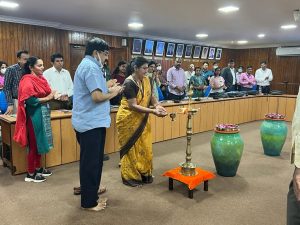 Inauguration of the programme by Dr Seema Jaggi, ADG (HRD), ICAR
Inauguration of the programme by Dr Seema Jaggi, ADG (HRD), ICAR
TECHNICAL SESSIONS
The technical sessions were organized in six modules as elucidated below.
1. Basic statistical tools for data analysis
The training sessions commenced with a lecture on CMFRI by Dr A Gopalakrishnan, Director, ICAR-CMFRI. The purpose of the lecture was to orient the participants on the various research achievements of the institute. After this, there were various sessions on basic statistical analytical methods, such as descriptive and inferential statistics, which are important for gaining basic insights into the data. Sampling techniques, an important topic for Social Science researchers, were also given due importance in the subsequent session and trainees were exposed to a unique sampling strategy adopted by the CMFRI scientists in estimating marine fisherie resources.
The session also discussed the parametric and non-parametric tests for hypothesis testing which are of paramount importance in Social Science research. When data fails to follow the assumptions of normal distribution, non-parametric tests can be used depending on the number and nature of the samples.
Table 1. Typology of various non-parametric tests that can be used for Social Science research
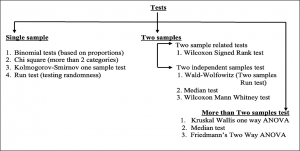
| Scaling Techniques Different scaling techniques used commonly in scale construction were also discussed in detail. Likert scale is the most common and powerful tool that has been used for a long time. Paired comparison technique is used widely but as the number of items to be compared increases, the technique become more complicated. Equal appearing interval scale and successive interval scales give scale values to the items, but the scaling process is tedious. Q-sort technique provides a continuum of 9/12/15 numbers for which positive and negative effect (bipolar effect) is marked. |
The various scaling techniques, basics of correlation and regression, data diagnostics and transformation were also dealt with comprehensively by citing examples. These sessions helped the participants gain traction for the forthcoming sessions on advanced regression models.
2. Hands-on training using different statistical software packages
The major attraction of this Winter School was the hands-on training with different data analysis software. Participants were introduced to working interfaces of software, such as MS Excel, IBM SPSS, R and R Studio, STATA, SAS and QGIS. More emphasis was laid on using the R Studio software as it is open source and most of the participants showed keen interest in learning it. An introductory session to SYSTAT 13.2 and SigmaPlot 15 software was also organised. The coordinators and project staff of CMFRI helped participants with the R codes that were shared prior to the practical sessions, which were appreciated by the participants. Participants were also exposed to reliable online websites for accessing the R codes and SAS codes, such as ‘Strengthening Statistical Computing for NARS’ – Reference Manual by ICAR-IASRI (Strengthening Statistical Computing for NARS (iasri.res.in)). After the rigorous use of R Studio in many sessions, the participants were confident enough to handle the software which was reflected in their feedback. Interest in learning non-accessible and paid software was found to be very low among most of the trainees.
A special session on GIS using open source software called QGIS was also conducted. GIS helps analyse and visualise spatial data for research purposes and this session mainly focussed on creating location maps which is very important for our research.
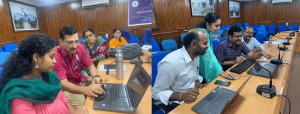 Hands-on training sessions
Hands-on training sessions
3. Advanced statistical tools for data analysis
The sessions in this module mainly focused on various non-parametric regression models, such as generalised additive models, tobit models, probit and logistic regression. This category of regression analysis can be used when the predictor does not take a predetermined form but is constructed according to information derived from the data. Participants were also introduced to spatial regression analysis and panel data regression techniques in this module.
4. Multivariate analytical techniques
This module mainly focused on various analytical tools that can be used to address problems arising from multidimensional data, where there are more dependent variables. Data classification techniques, such as cluster analysis (an unsupervised learning tool) and linear discriminant analysis, which comes under supervised learning tools, were explained. The concepts of multidimensional scaling, principal component analysis and factor analysis were also explained using suitable examples.
5. Time series analysis and forecasting
The sessions on this theme progressed systematically. They started from the basics and slowly moved to advanced analytical tools. The time series and forecasting sessions began from the second week. The resource persons were mostly from ICAR-IASRI and they conducted online classes. Then, a few lectures were given in offline mode by experts from ICAR-CMFRI. The application of linear and non-linear time series models for forecasting was discussed. The different linear time series models, such as the Autoregressive (AR) model, ARIMA and non-linear models ARCH and GARCH, were discussed in detail. Technology forecasting methods, such as the Delphi method, cross-impact analysis, scenario development and substitution curves were discussed briefly. Advanced statistical models, Support Vector Regression (SVR) and Bayesian Regression for crop yield forecasting, were also covered. Then analysis of volatile data using a stochastic volatility model was discussed in detail. An overview of the deep learning models used in forecasting was given next. The co-integration technique used for price integration between different markets was also discussed with examples. The other topics covered under this theme were the structural break analysis using time series methods and the applications of Machine Learning (ML) algorithms in time series data analysis. After each session, a practical was conducted using software. The sessions gave an overall idea about how to apply newer analytical tools, such as AI, ANN and ML.
6. Socio-economic analytic tools
Qualitative data analytical tools have been gaining prominence recently in Social Science research. Keeping this in view, there were sessions on data mining using software such as Veka software. The different methods that can be used were explained in detail and are useful in research to perform predictions, classification, clustering, association and grouping of data with perfection in the research area. Another interesting session was on Discrete Choice experiments which find application in decision-making. During the session, the derivation of choice models and design of such experiments were treated in detail. There was also a session on propensity score matching, a popular tool for impact analysis that the participants found very useful. Ecosystem service evaluation, social network analysis, methodology for Index development, case study research, risk assessment strategies, and measurement of technical efficiencies were other important sessions that came under this module.
7. Exposure Visits
- Visit to Marine Fish Landing Centre: As part of the Winter School, trainees were taken to a marine fish landing centre near the institute to educate participants on the procedure for estimating marine fish landings. The trainees had interactions with the technical staff of CMFRI who acts as enumerators for carrying out the fish stock assessment in the landing centre. This visit helped them to understand more about the sampling procedure followed by CMFRI for marine fish stock assessment.
- Visit to ICAR-CIFT, Kochi: At CIFT, trainees visited ATIC, Fishing Technology Division, Fish Processing Division and interacted with the scientists. On the whole this visit provided glimpses of research and extension activities undertaken by CIFT.
- Visit to inhouse facilities of CMFRI: The trainees also visited the library, marine biodiversity museum and aquarium inside the campus. The ICAR-CMFRI has one of the best specialized libraries on Fisheries Science. The open-access institutional repository named ‘Eprints@CMFRI’ was a major attraction. In the museum and aquarium, trainees could see the huge collection of marine biodiversity.
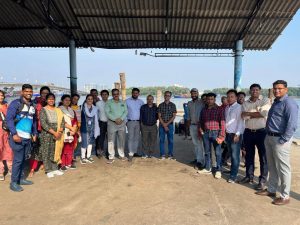 Visit to marine fish landing centre
Visit to marine fish landing centre
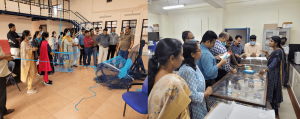 Visit to Fish Technology Division at CIFT/Visit to packaging laboratory at CIFT
Visit to Fish Technology Division at CIFT/Visit to packaging laboratory at CIFT
8. Valedictory Session
After the successful completion of all the technical sessions, the valedictory programme was organized on 31 January, 2022. The course director, Dr Eldho Varghese, presented a detailed report of the sessions undertaken and also the feedback provided by the participants through Google Forms. The majority of the trainees disclosed that they were highly satisfied with the Winter School programme. A pre- and post-assessment of trainees’ knowledge regarding advanced analytical tools were undertaken by the organizing team. With the results of both these tests, they performed a ‘paired t test’ and found a significant improvement in the post-training knowledge level of the trainees. During the programme, three trainees gave their feedback and some suggestions. The support provided by the ICAR-CMFRI organizing team was warmly appreciated in the feedback. The Director of ICAR-CMFRI gave his presidential address and highlighted the need for collaborations among social scientists for better research outputs. He also ensured support from CMFRI for future research endeavours of the trainees. The chief guest of the programme, Dr B Meena kumari (Former Chairperson of National Biodiversity Authority and former DDG [Fisheries] of ICAR) emphasised the need for more such training programmes for networking among social scientists. Further on, certificates and e-manuals were presented to the participants.
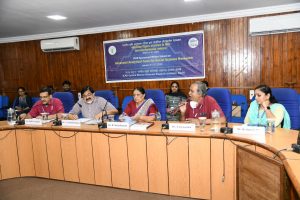
Perception of trainees about the Winter School
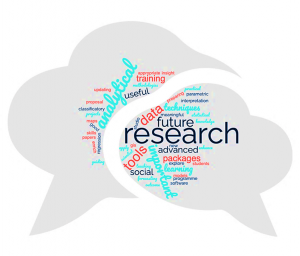 The perception of participants about the Winter School was obtained using a semi-structured questionnaire prepared in Google Form. Out of 20 participants, 18 gave their responses. After analysing the responses,
The perception of participants about the Winter School was obtained using a semi-structured questionnaire prepared in Google Form. Out of 20 participants, 18 gave their responses. After analysing the responses,
we arrived at the following conclusions:
- It was noted that 14 of the trainees perceived offline training sessions as more effective compared to online sessions, while 4 of the respondents had an opinion that both offline and online lectures were equally effective. None of the trainees preferred online over the offline mode.
- The trainees were asked to provide the overall rating for the Winter School considering the content, execution, relevance of the lectures covered, etc. More than half of the respondents (n=10) rated it as very good, while 4 of them rated the programme as excellent, and the remaining 4 as good.
- The relevance of different sessions conducted during the Winter School was rated on a five point continuum by the trainees (Highly relevant = 5 to Not relevant = 1). The results revealed that the sessions on parametric and non-parametric regression models were perceived as highly relevant by the largest proportion of trainees.
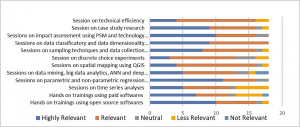 Figure1: Perceived relevance of different sessions by the trainees
Figure1: Perceived relevance of different sessions by the trainees
- The difference in perceived relevance of the sessions based on the specialization of the respondents were assessed, and it was found that the trainees with economics background perceived high relevance for the lectures on time series models, data mining, big data analystics, ANN and deep learning, etc., compared to those with extension background. Furthermore, the extension faculty highly preferred the sessions on sampling methods and data collection tools, data classificatory and dimension reduction techniques, case study research and impact assessment compared to the economics faculty.
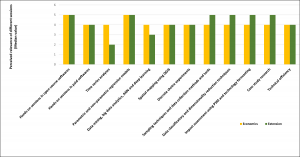 Figure 2: Difference in perceived relevance of sessions based on the specialisation of trainees
Figure 2: Difference in perceived relevance of sessions based on the specialisation of trainees
- The trainees were asked to rate their perceived knowledge level on certain selected topics, before and after the Winter School, on a three point continuum (low, medium and high) and responses were noted (see Figure 3). The graph shows that in all the selected topics the trainees’ knowledge level had improved compared to the pre-training phase.
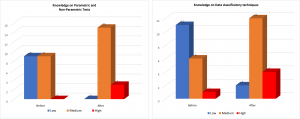
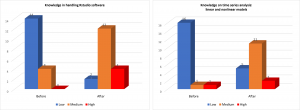 Figure 3. Difference in perceived knowledge level of trainees before and after the Winter School
Figure 3. Difference in perceived knowledge level of trainees before and after the Winter School
OUR IMPRESSIONS
- The Winter School was meticulously planned so as to cover basic analytical tools to advanced methods. Though each topic covered could by itself have taken up the 21 days of the Winter School, the resource persons and coordinators ensured that justice was done to each topic considering the time constraints.
- The training manuals provided were very comprehensive – in two volumes – covering all the topics with practical examples. The coordinators had very efficiently edited and compiled the content of manuals under different themes. They also provided an e-manual in CD form to all the trainees. This will be very useful as future reference material.
- More substance on the data interpretation part can be included in similar training programmes rather than just giving emphasis on theoretical background of each analytical tool. This may cater to the need of diverse groups of trainees who don’t have much statistical background.
- The use of R Studio software was an important learning outcome from this Winter School as every resource person had shared the R codes, which the participants used during the practical sessions and the organisers of the Winter School also assisted the trainees in running the codes and getting the outputs. The practical sessions increased confidence among the trainees to employ R in their further analysis of the research data.
- Though there are several online and offline training resources available for advanced analytical tools, offline trainings of this nature provide opportunity to clarify our concepts and refine our understanding. Also, such trainings provide a platform for network building and interaction with researchers, which will benefit the participants in future.
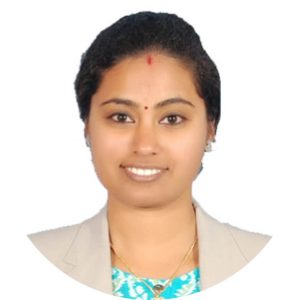 Dr Aswathy Chandrakumar, Scientist (Agrl. Extension), Transfer of Technology section, ICAR-Directorate of Cashew Research, Puttur, Dakshina Kannada, Karnataka. e-mail: aswathy.c@icar.gov.in
Dr Aswathy Chandrakumar, Scientist (Agrl. Extension), Transfer of Technology section, ICAR-Directorate of Cashew Research, Puttur, Dakshina Kannada, Karnataka. e-mail: aswathy.c@icar.gov.in
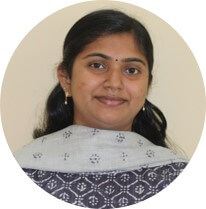 Dr Misha Madhavan M, Scientist, Division of Agricultural Extension, ICAR – Indian Agricultural Research Institute, New Delhi – 110012. e-mail: misha.m@icar.gov.in
Dr Misha Madhavan M, Scientist, Division of Agricultural Extension, ICAR – Indian Agricultural Research Institute, New Delhi – 110012. e-mail: misha.m@icar.gov.in
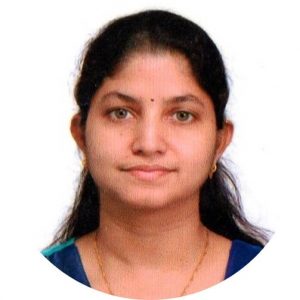 Dr Sulaja OR, Assistant Professor & Head, Dept. of Agricultural Extension, College of Agriculture, Padanakkad, Kerala Agricultural University. e-mail: sulaja.or@kau.in
Dr Sulaja OR, Assistant Professor & Head, Dept. of Agricultural Extension, College of Agriculture, Padanakkad, Kerala Agricultural University. e-mail: sulaja.or@kau.in
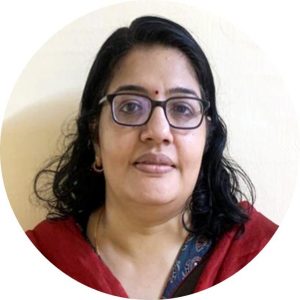 Dr Hema M, Asst. Professor, Dept. of Agricultural Economics, College of Agriculture, Kerala Agricultural University, Vellanikkara, Thrissur, Kerala. e-mail: hema.m@kau.in
Dr Hema M, Asst. Professor, Dept. of Agricultural Economics, College of Agriculture, Kerala Agricultural University, Vellanikkara, Thrissur, Kerala. e-mail: hema.m@kau.in

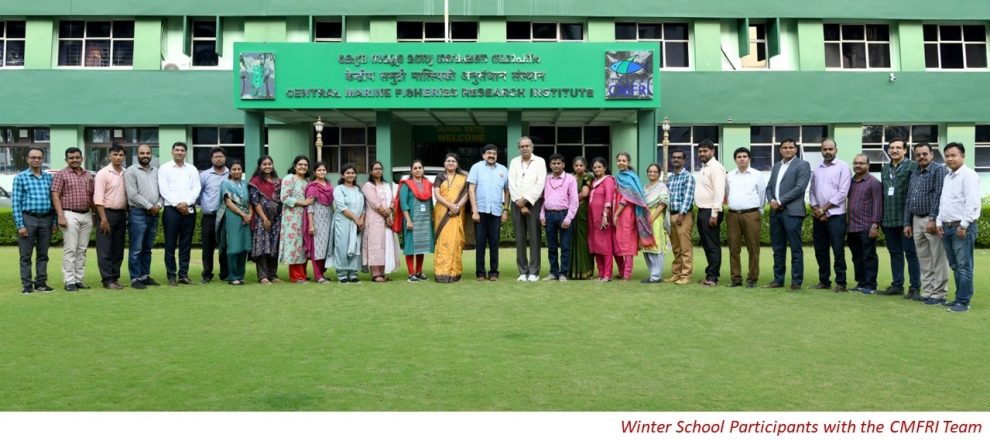

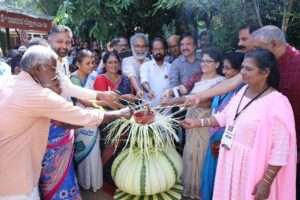

Add Comment